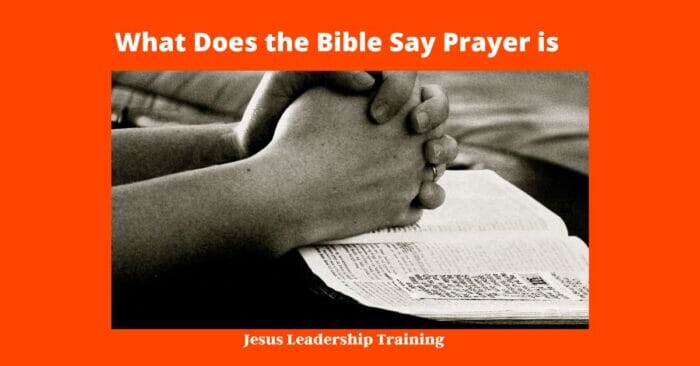What Does the Bible Say Prayer is – The Bible, which is the sacred text for Christians, speaks about prayer in many different ways. It teaches that prayer is an essential part of the relationship between humans and God.
According to the Bible, prayer is a way for us to communicate with God and to express our love, thanksgiving, and faith in Him. Through prayer, we can ask God for help in times of need, and can seek His guidance in our lives. Additionally, prayer gives us the chance to express our deepest feelings and emotions, and to thank God for His many blessings. In short, prayer is an important act of devotion, and it is a way to show reverence and faith in God.
Table of Contents
What Does the Bible Say Prayer is
Prayer is an important part of religious life, and it can take many forms. In the Bible, prayer is an act of communication between humans and God. It is an important part of Christian faith, and is a powerful tool for believers. In this article, we’ll be exploring what the Bible says about prayer, from its definition to its power and purpose.

The Definition of Prayer According to the Bible
The Bible defines prayer as “the earnest petition of a petitioner to God” (The Bible, James 5:16). This is a simple definition, but it captures the essence of prayer. Prayer is a special kind of communication that is directed to God, and it is essential to living a life of faith.
The Power of Prayer in the Bible
The Bible teaches that prayer is powerful. It is a direct line to God, and through prayer believers can access God’s power and strength. In the Bible, prayer is often described as a “weapon” (The Bible, Ephesians 6:18). It is a powerful tool that believers can use to access God’s power and strength.
Examples of Powerful Prayer in the Bible
- The Lord’s Prayer – This is perhaps the most well-known prayer in the Bible. It is found in Matthew 6:9-13 and Luke 11:2-4. This is a prayer that Jesus gave to His disciples to guide them in their prayers. It is a prayer of thanksgiving and acknowledgement of the Lord’s glory and power, as well as a plea for His mercy and grace.
- Moses’ Prayer for the People of Israel – In Exodus 32:11-14, Moses prayed for the people of Israel after they had made a golden calf and worshiped it. He pleaded with God to forgive their sins and show mercy to them.
- Daniel’s Prayer of Confession – In Daniel 9:3-19, Daniel prayed a prayer of confession and repentance. He confessed the sins of his people and pleaded with God to forgive them and to restore them to His favor.
- Hannah’s Prayer for a Child – Hannah is known for her prayer in 1 Samuel 1:9-20. She was barren and desperate for a child, so she prayed to God and promised that if He granted her request, she would dedicate the child to the Lord.
- Solomon’s Prayer for Wisdom – Solomon asked the Lord for wisdom in 1 Kings 3:5-15. He prayed for discernment to lead his people, and God granted his request.
- Jesus’ Prayer in the Garden of Gethsemane – In Matthew 26:36-46, Jesus prayed in the Garden of Gethsemane before His arrest. He prayed for strength to endure the coming trial and suffering, and asked God to let the cup pass from Him if it was His will.
How to Pray According to the Bible
The Bible offers a few instructions on how to pray. It teaches that believers should pray with an attitude of humility and reverence (The Bible, 1 Peter 5:6). Additionally, the Bible teaches that believers should pray with faith, knowing that God can do anything (The Bible, Matthew 21:22). Finally, the Bible teaches that believers should be persistent in their prayers (The Bible, Luke 18:1).

What the Bible Says About Praying with Faith
The Bible teaches that prayer is powerful when it is done with faith. The Bible says, “Without faith, it is impossible to please God” (The Bible, Hebrews 11:6). This means that faith is essential in order for prayers to be effective. The Bible teaches that faith in God is necessary in order to access His power and strength.
Unpacking Hebrew Words about Prayer
- Tefillah (תפילה): The Hebrew word for “prayer,” derived from the root meaning “to judge” or “to make a request.” It is typically used to refer to formal, communal prayer.
- Tefillat (תפילת): The Hebrew word for “prayers,” derived from the root meaning “to judge” or “to make a request.” It is typically used to refer to a collection of formal, communal prayers.
- Tzom (צום): The Hebrew word for “fasting,” derived from the root meaning “to abstain” or “to hold back.” It is typically used to refer to the practice of abstaining from food or drink for a period of time.
- Avodah (עבודה): The Hebrew word for “service,” derived from the root meaning “to work” or “to do.” It is typically used to refer to spiritual service or worship.
- Shacharit (שחרית): The Hebrew word for “morning prayer,” derived from the root meaning “early” or “dawn.” It is typically used to refer to the morning prayer service.
- Mincha (מנחה): The Hebrew word for “afternoon prayer,” derived from the root meaning “gift” or “offering.” It is typically used to refer to the afternoon prayer service.
- Maariv (מעריב): The Hebrew word for “evening prayer,” derived from the root meaning “removal” or “departure.” It is typically used to refer to the evening prayer service.
- Kaddish (קדיש): The Hebrew word for “sanctification,” derived from the root meaning “holy” or “sacred.” It is typically used to refer to a special prayer said during services.
Unpacking Greek Words about Prayer
- Proseuche (προσευχή): This Greek word translates to “prayer” and is used in the New Testament to refer to a formal prayer. It is derived from the verb “proseuchomai” which means “to pray” or “to make a request.”
- Deesis (δέησις): This term translates to “prayer” and is used in the New Testament to refer to a petition or request for something. It is derived from the verb “deomai” which means “to ask” or “to beg.”
- Eucharistia (εὐχαριστία): This Greek word translates to “thanksgiving” and is used in the New Testament to refer to prayers of thanksgiving and gratitude. It is derived from the verb “eucharisteo” which means “to give thanks.”
- Enteuxis (ἔντευξις): This term translates to “request” and is used in the New Testament to refer to a specific request made in prayer. It is derived from the verb “enteuxomai” which means “to make a request.”
- Proskuneo (προσκυνέω): This Greek word translates to “worship” and is used in the New Testament to refer to a prayer of adoration and reverence for God. It is derived from the verb “proskuneo” which means “to worship.”
Unpacking Aramaic Words about Prayer
- Shema: This is one of the most important Aramaic words used in prayer. It means “listen” and is the beginning of the Jewish Shema prayer, which is the most important prayer of the Jewish faith.
- Baruch: This word is used in many Jewish prayers and means “blessed.” It is often used as a sign of respect and gratitude to God.
- Tefillah: This word translates to “prayer” in Aramaic and is commonly used in Jewish prayers.
- Hallel: This word translates to “praise” in Aramaic and is used to express gratitude and praise to God.
- Berakhah: This word translates to “blessing” in Aramaic and is used to ask for divine blessings from God.
- Elohim: This is a name for God in Aramaic, and is often used in prayers.
- Shalom: This is a greeting in Aramaic that translates to “peace” and is often used in prayer to ask for peace and comfort.
- Tehillah: This word translates to “song of praise” in Aramaic and is used to express joy and gratitude to God.
- Ma’ariv: This is a prayer said at night in Aramaic, and it translates to “evening prayer.”
- Kaddish: This is a prayer of mourning in Aramaic, and it translates to “may his name be praised.”
The Role of the Lord in Prayer
The Bible teaches that God is the one who answers prayers. The Bible says, “The Lord hears the prayers of the righteous” (The Bible, Psalm 34:17). This means that God is the one who hears and answers prayers. He is the one who has the power and strength to bring about change.
The Benefits of Entering Into Prayer
The Bible teaches that prayer has many benefits. When believers enter into prayer, they invite God into their lives and hearts. This can be a source of strength, comfort, and peace. Additionally, the Bible teaches that prayer can bring healing and guidance, and it can help believers grow closer to God.

What Jesus Taught About Prayer
The Bible records many teachings of Jesus about prayer. He taught his disciples to pray with an attitude of humility and reverence (The Bible, Matthew 6:5-13). Additionally, He taught them to pray for others and with faith (The Bible, Luke 11:9-13). Jesus also taught about the power of persistent prayer (The Bible, Luke 18:1).
What Amen Means in Prayer
The word “Amen” is often used at the end of prayers. The word “Amen” is a Hebrew word that means “so be it” or “truly”. In the Bible, it is used to express agreement and acceptance. It is a way for believers to affirm their faith and trust in God.
Types of Prayer
- Prayers of Adoration: These prayers are used to praise and worship God for His greatness and goodness. Examples of prayers of adoration include: “Oh Lord, you are the ruler of the universe and I am in awe of your power and glory. I thank you for all that you have done for me and for all of your blessings. Amen.”
- Prayers of Thanksgiving: These prayers are used to express thanks for God’s grace and mercy. Examples of prayers of thanksgiving include: “Lord, I thank you for the gift of life and for all the blessings you have bestowed upon me. I am so grateful for your goodness and faithfulness. Amen.”
- Prayers of Confession: These prayers are used to confess sins and seek forgiveness. Examples of prayers of confession include: “Lord, I confess my sins to you and ask for your forgiveness. I am sorry for my wrongdoings and I am determined to turn away from them. Help me to remain faithful to you. Amen.”
- Prayers of Supplication: These prayers are used to make requests to God. Examples of prayers of supplication include: “Lord, I come before you asking for your guidance and help in this difficult time. Please grant me the strength and wisdom to make the right decisions. Amen.”
- Prayers of Intercession: These prayers are used to intercede on behalf of others. Examples of prayers of intercession include: “Lord, I come before you asking for your mercy and grace for my family and friends. Please grant them comfort, peace, and strength during this time. Amen.”
- Prayers of Petition: These prayers are used to ask God for specific desires. Examples of prayers of petition include: “Lord, I come before you asking for a job opportunity that will allow me to provide for my family. Please grant me this favor and help me to use it for your glory. Amen.”
How to Pray
Prayer is an important part of many religious traditions and is a powerful way to connect with God, the Universe, or whatever higher power you may believe in. Prayer can be a way to ask for help and guidance, to express gratitude, and to express our deepest desires and emotions. In this blog, we will explore how to pray, why prayer is important, when and how long to pray, and where to pray.
Why Prayer
Prayer has been used for centuries by people of all faiths as a way to connect with the divine and to seek guidance, healing, and blessings. For many, prayer is an important part of their spiritual practice, and a way to express their faith and connect with God. While prayer can be used to ask for help, it can also be used to express gratitude, joy, and other positive emotions.
How to Pray
Prayer can take many forms, and there is no one right way to pray. Prayer can be silent or spoken, and can be done alone or in groups. It can be a formal ritual or a spontaneous expression of emotion. Some people use written prayers or mantras, while others simply talk or think to God or their higher power.
When to Pray
There is no one right time to pray, and you can pray whenever you feel the need. Some people like to pray at the same time each day, while others prefer to pray spontaneously throughout the day. There are no hard and fast rules, and you should choose the time and method of prayer that works best for you.
Where to Pray
Prayer can be done anywhere, and many people prefer to pray in a place of spiritual significance such as a church, synagogue, or sacred place. Others prefer to pray in a place of natural beauty such as a park or beach. You can also pray in your home or wherever you feel most comfortable.
How Long are Prayers
The length of a prayer depends on the person and their needs. Some people prefer a short prayer of a few sentences, while others may pray for longer periods of time. Many people find that a few minutes of prayer is enough to feel a sense of connection and peace. Ultimately, you should pray however long it takes to feel connected to your higher power.
Praying with a Sincere Heart in the Bible
The Bible teaches that prayer should be done with a sincere heart. The Bible says, “The Lord is near to all who call upon Him, to all who call upon Him in truth” (The Bible, Psalm 145:18). This means that God hears and answers prayers that are done with sincerity and truth.
Praying for Others as Taught in the Bible
The Bible encourages believers to pray for each other. The Bible says, “Confess your faults to one another, and pray for one another, that you may be healed” (The Bible, James 5:16). This means that believers should be willing to pray for one another, and to be open and honest about their struggles and needs.
The Effects of Praying Consistently in the Bible
The Bible teaches that prayer has many long-term benefits. When believers pray consistently, they can grow closer to God and become more attuned to His will for their lives. Additionally, the Bible teaches that prayer can bring about healing and guidance, and can help believers stay focused on God’s purpose for their lives.
Final Thoughts – What Does the Bible Say Prayer is
Prayer is an important part of Christian faith and life. In the Bible, prayer is defined as an earnest petition of a petitioner to God. The Bible teaches that prayer is a powerful tool that believers can use to access God’s power and strength. Additionally, the Bible teaches that prayer should be done with reverence, faith, and sincerity. Finally, the Bible teaches that prayer can bring about healing and guidance, and can help believers stay focused on God’s purpose for their lives.




